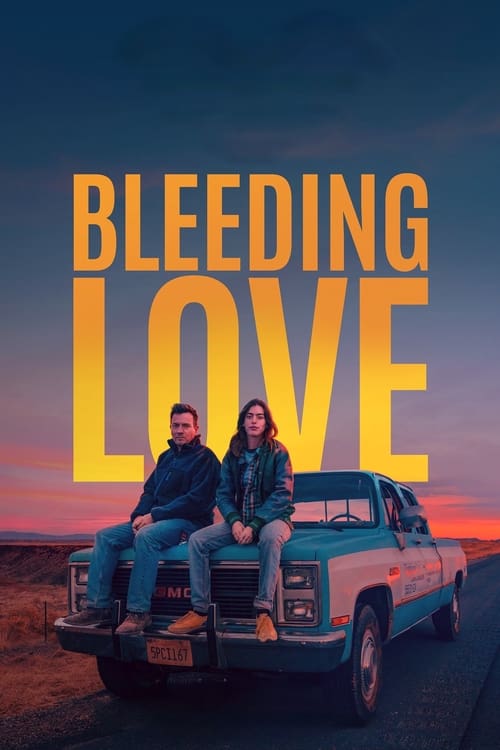Bleeding Love – Film Review
Published February 17, 2024

Bleeding Love, the much-anticipated drama that promised a heartfelt dive into the complexities of addiction and familial bonds, emerges as a commendable yet imperfect film. Marking Emma Westenberg‘s directorial debut in feature-length cinema, the film ambitiously aims to thread together an intimate narrative laced with themes of redemption, love, and inherited pain. Central to the movie’s appeal is the real-life father-daughter duo of Ewan McGregor and Clara McGregor, who bring an undeniably authentic dynamic to the screen. The screenplay, penned by Ruby Caster, emerges from an original story crafted by Caster, Clara McGregor, and Vera Bulder. Despite its strong premise and promising cast, Bleeding Love finds itself struggling to fully deliver on its poignant potential.
At its core, Bleeding Love introduces us to a strained relationship between a father (Ewan McGregor) and his daughter (Clara McGregor), bound by a shared battle against addiction. The plot revolves around a secret journey to rehab, initiated by the father after his daughter overdoses. This plotline, rich with the promise of emotional depth, seeks to unravel the layers of guilt, responsibility, and love that exist within familial connections strained by substance abuse.
Performance-wise, the McGregors’ real-life connection translates into a potent chemistry onscreen. Ewan McGregor, with a career-long knack for portraying complex characters, skillfully embodies a man torn between his past mistakes and his desperate wish for his daughter’s redemption. Clara McGregor, though relatively new to the cinematic landscape in comparison to her father, holds her own with a nuanced portrayal of vulnerability and defiance. Their interactions are the heart of the movie, drawing viewers into the personal world of their characters with authenticity and emotional gravity.
Emma Westenberg’s direction, though ambitious, reveals a certain rawness that one might expect from a debut feature-length film. While there are moments where her vision shines through—particularly in intimate scenes that require a subtle hand—the narrative at times feels uneven, struggling to maintain a steady pace and emotional cadence. However, the potential for growth is evident, suggesting that Westenberg could evolve into a more cohesive storyteller with more experience.
The screenplay by Ruby Caster serves as both a strength and a weakness for Bleeding Love. On one hand, the dialogue often rings true, capturing the essence of the characters’ struggles and emotions with sincerity. On the other hand, the story sometimes stumbles into cliché territory, veering towards predictable plot developments that detract from its overall impact. The collaborative nature of the story’s creation—by Caster, Clara McGregor, and Vera Bulder—adds an interesting layer of depth, but the narrative could have benefitted from tighter plotting and a more innovative approach to its subject matter.
Visually, Bleeding Love offers a competently shot film, albeit lacking in distinct stylistic flair. The cinematography opts for a straightforward approach, focusing on the actors’ performances rather than employing elaborate visual techniques. While this choice underscores the film’s thematic emphasis on character and relationships, a more adventurous visual palette might have elevated the overall storytelling experience.
One of the more commendable aspects of Bleeding Love is its soundtrack, which adeptly complements the emotional tone of the film. The music selections show a keen understanding of the film’s atmosphere, enhancing pivotal scenes without overwhelming the narrative. Soundtrack choices can often make or break the audience’s emotional engagement, and in this case, Bleeding Love manages to strike a mostly harmonious balance.
In assessing the impact of Bleeding Love, it is impossible not to acknowledge its thematic ambition. The film tackles the weighty issue of addiction with respect and a clear intent to highlight its complexities rather than exploit them for dramatic effect. The choice to explore the generational aspect of addiction, with a focus on the inherited nature of such struggles, adds a poignant layer to the story. Nevertheless, the execution of these themes occasionally lacks the depth and nuance necessary to truly resonate with viewers on a profound level.
Bleeding Love is a film that radiates potential and earnestness, marked by commendable performances and a compelling core narrative. However, its overall impact is somewhat dulled by inconsistent pacing, predictable plotting, and a lack of distinctive directorial vision. Despite its flaws, the film offers enough emotional depth and character-driven moments to merit attention, particularly for those intrigued by the real-life dynamic of the McGregors. Bleeding Love is, ultimately, a story about the hard road to healing and the unbreakable bonds that can guide us through darkness—a message worth reflecting on, even if the journey there is somewhat uneven.
